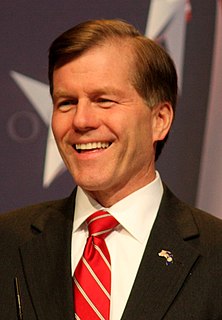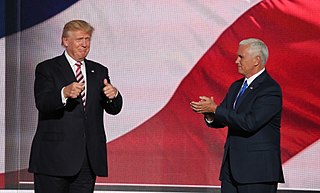
The Indiana gubernatorial election of 2008 was held on November 4, 2008. Incumbent Republican nominee Mitch Daniels was challenged by Democratic nominee Jill Long Thompson and Libertarian nominee Andy Horning. Daniels easily won reelection, defeating Long Thompson by over 17 points.

The Michigan gubernatorial election of 2010 was held on November 2, 2010. Incumbent Democratic Governor Jennifer Granholm was prohibited by the state's Constitution from seeking a third term. This resulted in a large pool of candidates which was whittled down, when the May 11 filing deadline passed, to two Democrats and five Republicans. Both the Cook Political Report and the non-partisan Rothenberg Political Report rated the election as leaning Republican.

United States gubernatorial elections were held in 12 states and two territories. Of the eight Democratic and four Republican seats contested, only that of North Carolina changed party hands, giving the Republicans a net gain of one governorship. These elections coincided with the presidential election on November 6, 2012.

The 2012 United States House of Representatives elections in Indiana were held on Tuesday, November 6, 2012 to elect the nine U.S. Representatives from the state, one from each of the state's nine congressional districts. The elections coincided with the elections of other federal and state offices, including a quadrennial presidential election, an election to the U.S. Senate, and a gubernatorial election.

The Michigan gubernatorial election of 2014 took place on November 4, 2014, to elect the Governor of Michigan, concurrently with the election of Michigan's Class II U.S. Senate seat, as well as other elections to the United States Senate in other states and elections to the United States House of Representatives and various state and local elections.

The 2014 Minnesota gubernatorial election took place on November 4, 2014, to elect the governor of Minnesota concurrently with the election to Minnesota's Class II U.S. Senate seat, as well as other elections to the United States Senate in other states and elections to the United States House of Representatives and various state and local elections.

Glenda Ritz is the former Superintendent of Public Instruction for Indiana. She was elected November 6, 2012, defeating incumbent Superintendent Dr. Tony Bennett in an upset election, and she took office with a state government dominated by Republicans who opposed her agenda and could block it. Among Indiana Democrats, she held the highest elected office in state government during her term of office. She is the first Democrat to serve in the office in 40 years and the first Democrat to win any down ballot race in the state since 1996.

United States gubernatorial elections were held on November 8, 2016 in 12 states and two territories. The last regular gubernatorial elections for nine of the 12 states took place in 2012. The last gubernatorial elections for New Hampshire, Oregon, and Vermont took place in 2014, as Oregon held a special election due to the resignation of governor John Kitzhaber, while the governors of New Hampshire and Vermont both serve two-year terms. The 2016 gubernatorial elections took place concurrently with several other federal, state, and local elections, including the presidential election, Senate, and House elections.

The 2016 United States Senate election in Indiana was held on November 8, 2016, to elect a member of the United States Senate to represent the State of Indiana, concurrently with the 2016 U.S. presidential election, as well as other elections to the United States Senate in other states and elections to the United States House of Representatives and various state and local elections.

The 2016 Indiana gubernatorial election was held on November 8, 2016, to elect the Governor and Lieutenant Governor of Indiana, concurrently with the 2016 U.S. presidential election as well as elections to the United States Senate and elections to the United States House of Representatives and various state and local elections. The primaries were held on May 3, 2016. Republican Lieutenant Governor Eric Holcomb won the race with 51.4% of the vote.

A general election was held in the U.S. state of Indiana on November 4, 2014. Three of Indiana's executive officers were up for election as well as all of Indiana's nine seats in the United States House of Representatives. The Republican nominees won all three statewide elections and all of Indiana's U.S. Representatives were re-elected.

Eric Joseph Holcomb is an American politician serving as the 51st governor of Indiana since January 2017. From March 2016 to January 2017 he was the 51st lieutenant governor of Indiana under Governor Mike Pence, now the 48th Vice President of the United States. Holcomb was nominated to fill the remainder of Lieutenant Governor Sue Ellspermann's term after Ellspermann resigned on March 2, 2016, to become president of Ivy Tech Community College. A member of the Republican Party, Holcomb won the 2016 election for Governor of Indiana over Democratic nominee John R. Gregg.

This article lists potential candidates for the Republican nomination for Vice President of the United States in the 2016 United States presidential election. Businessman Donald Trump of New York, the 2016 Republican nominee for President of the United States, considered several prominent Republicans and other individuals before selecting Governor Mike Pence of Indiana as his running mate on July 15, 2016. Pence formally won the vice presidential nomination on July 19, 2016, at the 2016 Republican National Convention. As the Trump-Pence ticket won the 2016 presidential election, Pence became Vice President of the United States on January 20, 2017.

The 2018 Ohio gubernatorial election took place on November 6, 2018, to elect the next governor of Ohio, concurrently with the election of Ohio's Class I U.S. Senate seat, as well as other elections to the United States Senate in other states and elections to the United States House of Representatives and various Ohio and local elections. Incumbent Republican Governor John Kasich was term-limited and could not seek reelection to a third consecutive term.

The 2018 South Dakota gubernatorial election took place on November 6, 2018, to elect the next governor of South Dakota. Incumbent Republican governor Dennis Daugaard was term-limited and could not seek re-election to a third consecutive term.

The 2019 Kentucky gubernatorial election will take place on November 5 to choose the Governor of Kentucky. Primary elections will occur on May 21, 2019. Incumbent Republican Governor Matt Bevin is eligible to run for reelection to a second term. Bevin has announced that he will run for a second term, choosing State Senator Ralph Alvarado as his running mate over incumbent Lieutenant Governor Jenean Hampton. Since the state's constitutional prohibition of governors serving consecutive terms was repealed in 1992, no Republican Governor of Kentucky has ever been elected to consecutive terms. The only Republican to run for reelection, Ernie Fletcher, was defeated by Democrat Steve Beshear in 2007.



























